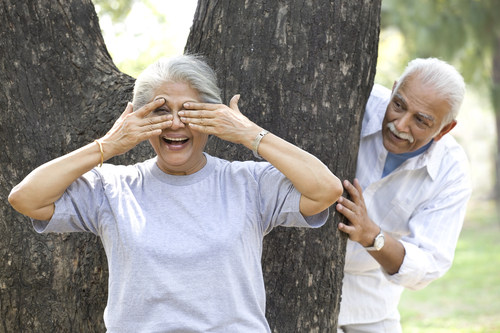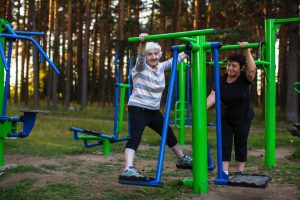
By: Danielle Palli and Cera Meintzer
“There is a thin line that separates laughter and pain, comedy and tragedy, humor and hurt.” -Erma Bombeck
The Coal Miners in My Head (Danielle’s first brush with humor)
When I was a child, I lost my hearing … at least, 80% of it, due to an ear infection in both ears, which was coupled with extreme pain. Certain I was going to remain deaf forever (when in fact, my hearing returned to normal several months later), I began learning sign language. At night, my ears and head hurt so much that I couldn’t sleep. At one moment, during a fit of tears, I had a thought. “What if the pounding in my ears is really a tiny team of coal miners just digging out the bad stuff in my head with teeny tiny picks?” The thought was so absurd, that for a moment, I found myself laughing, forgetting the pain. Thereafter, when I felt pain, I would smile. After all, it was just those darn coal miners again, and they were secretly helping me get better. This was when I discovered the enormous power of looking at this brighter side of life.
The Benefits of Humor, Laughter and Playfulness
Dr. Brown, founder of the National Institute for Play calls play a catalyst. A little bit of play, he writes, can go a long way toward boosting our productivity and happiness. Using play intentionally as a spring board in our lives can make life more enjoyable. Like many of us have discovered in our youth, one of the beneficial side effects of play is laughter. According to Dr. Brown “Laughter activates the body’s natural relaxation response. It’s like internal jogging, providing a good massage to all internal organs while also toning abdominal muscles.”
In the award-winning book, Live Long, Die Short: A Guide to Authentic Health and Successful Aging, Dr. Roger Landry, MD, MPH, dedicates an entire chapter in his book to laughter. It is among his ten tips for living, and aging, well. Why would a preventive medicine physician focus so much on something as simple as laughter, humor and playfulness? Like many creative pursuits that bring us joy, humor is fun, liberating and comes with a boatload of benefits, including:
- Stress reduction
- Increased creativity (“Humor is reason gone mad.” ~Groucho Marx)
- Better problem solving
- Better cardiovascular health (“Laughter is inner jogging.” ~Norman Cousins)
- Pain reduction
- Increased feelings of positivity and wellbeing
- Reduced depression and anxiety
- Increased immune function and resilience (“Humor is just another defense against the universe.” ~Mel Brooks)
- Lowered risk of cancer, heart disease and dementia
- Healthy stimulation of heart and lungs
- Better coping skills
- It’s a social connector (“You can discover more about a person in an hour of play than in a year of conversation.” ~Plato)
The Dark Side of Humor
Like all things, even humor has a dark side. Never has this been more evident than in today’s climate, where people may be highly sensitive to humor related to Covid-19. For some, joking about the oddities of daily life (i.e. running out of toilet paper, being stuck inside with toddlers and trying desperately not to touch our face) is a coping mechanism. For others, it may feel as if people are taking a serious subject and trivializing it. As a general word of caution, the “know your audience” tip applies. Avoid humor at the expense of others, and be mindful of how people may interpret jokes, even well-intentioned ones.
Playfulness Makes for a More Relaxed Parent (Cera’s Playful Aunt):
 I have an Aunt who embodies playfulness. She takes time to plan her life so it includes an element of play, like picking up a silly costume on the way to the hospital to inspire laughter in a friend who is struggling. I can remember one year – not long ago – when she visited my family in Colorado from Japan where she lives. We got out the costume box and dressed up silly, donned accents and spent the evening playing. She can always be counted on to add an element of fun to life, even the tougher moments.
I have an Aunt who embodies playfulness. She takes time to plan her life so it includes an element of play, like picking up a silly costume on the way to the hospital to inspire laughter in a friend who is struggling. I can remember one year – not long ago – when she visited my family in Colorado from Japan where she lives. We got out the costume box and dressed up silly, donned accents and spent the evening playing. She can always be counted on to add an element of fun to life, even the tougher moments.
As I have watched her through the years (with her kids and now her grandkids), she has been a parenting role model for me. Especially when it comes to the tough moments of parenting. I have learned to use playfulness and humor to redirect challenging behavior (especially my own). Have you ever tried to sing your frustration and stay mad? Next time you’re feeling upset for any reason and you want to verbally lash out, sing it. “This makes me very angryyyyyy, I really wish you would listen to meeeeee,” in a nice melodic tone, will stop kids in their tracks. They might look at you like you have gone crazy and then, you can’t help but smile back. It’s a great way to use humor and playfulness to break the cycle that otherwise could have ensued.
Getting Serious About Play
 As we grow and age into our mid-life and beyond, play is perceived by our society as unproductive, petty or even a guilty pleasure. The notion is that once we reach adulthood, it’s time to get serious and between personal and professional responsibilities; there’s no time to play.
As we grow and age into our mid-life and beyond, play is perceived by our society as unproductive, petty or even a guilty pleasure. The notion is that once we reach adulthood, it’s time to get serious and between personal and professional responsibilities; there’s no time to play.
It’s normal for us to see and expect playful attitudes and actions from children. Our societal standards tell us this is normal and necessary behavior for children and their development. But play is just as pivotal for adults as it is for kids. Dr. Scott Eberle is the vice president for play studies at a company called The Strong. He is also editor of the American Journal of Play. He says “We don’t lose the need for novelty and pleasure that play provides as we grow up. According to Dr. Eberle, “Research suggests that playfulness facilitates healing, improves morale, and increases motivation. It is vital for problem-solving, creativity and relationship-building.”
Tips for Inviting more Humor and Play into Your Day:
- Discover your humor style! Do you prefer witty banter, situational, absurd, satirical, or physical comedy? Explore movies, shows and podcasts to see what type of humor attracts you.
- Don’t feel limited to one form of humor – try books, comics, comedy clubs and even laughter yoga.
- Try having an entire conversation with someone using only song lyrics or lines from movies.
- As a fun experiment, provide three random words or objects to a friend, and ask them to wrap a story around it.
- Spend time with kids and animals … they’ll do all the work for you!
- Turn the sound off of a movie and make up your own dialogue between people.
- Follow Dr. Roger Landry’s advice in Live Long, Die Short. Every time you laugh, say “I’m getting healthier. I’m going to do more of this.”
Helpful References:
- https://www.mayoclinic.org/healthy-lifestyle/stress-management/in-depth/stress-relief/art-20044456
- https://www.theatlantic.com/health/archive/2013/03/the-benefits-of-optimism-are-real/273306/
- https://www.health.harvard.edu/heart-health/optimism-and-your-health
- https://www.ncbi.nlm.nih.gov/pmc/articles/PMC1375238/
- https://www.cbsnews.com/news/researchers-discover-optimism-may-lead-to-longevity/
Note: We encourage readers to share Masterpiece content. However, please see our guidelines for attribution.
